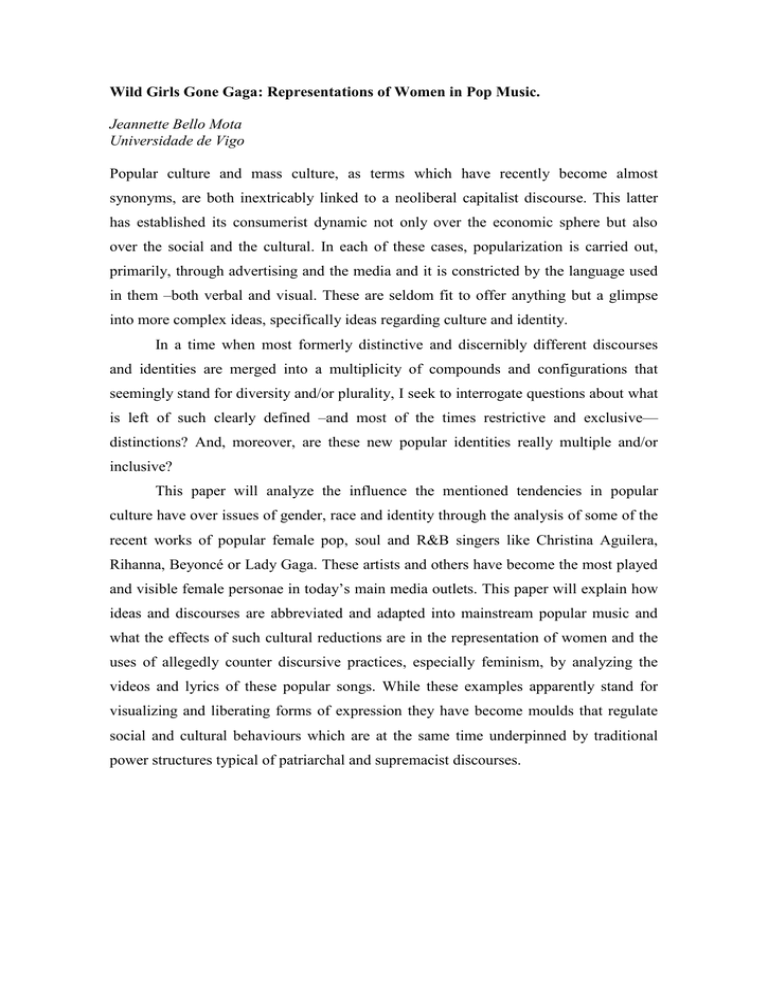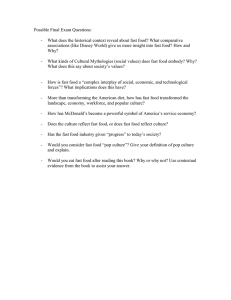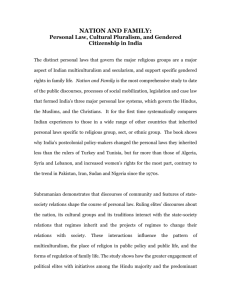Wild Girls Gone Gaga: Representations of Women in Pop Music.
advertisement

Wild Girls Gone Gaga: Representations of Women in Pop Music. Jeannette Bello Mota Universidade de Vigo Popular culture and mass culture, as terms which have recently become almost synonyms, are both inextricably linked to a neoliberal capitalist discourse. This latter has established its consumerist dynamic not only over the economic sphere but also over the social and the cultural. In each of these cases, popularization is carried out, primarily, through advertising and the media and it is constricted by the language used in them –both verbal and visual. These are seldom fit to offer anything but a glimpse into more complex ideas, specifically ideas regarding culture and identity. In a time when most formerly distinctive and discernibly different discourses and identities are merged into a multiplicity of compounds and configurations that seemingly stand for diversity and/or plurality, I seek to interrogate questions about what is left of such clearly defined –and most of the times restrictive and exclusive— distinctions? And, moreover, are these new popular identities really multiple and/or inclusive? This paper will analyze the influence the mentioned tendencies in popular culture have over issues of gender, race and identity through the analysis of some of the recent works of popular female pop, soul and R&B singers like Christina Aguilera, Rihanna, Beyoncé or Lady Gaga. These artists and others have become the most played and visible female personae in today’s main media outlets. This paper will explain how ideas and discourses are abbreviated and adapted into mainstream popular music and what the effects of such cultural reductions are in the representation of women and the uses of allegedly counter discursive practices, especially feminism, by analyzing the videos and lyrics of these popular songs. While these examples apparently stand for visualizing and liberating forms of expression they have become moulds that regulate social and cultural behaviours which are at the same time underpinned by traditional power structures typical of patriarchal and supremacist discourses. Bibliography: BENNETT, Andy (2009), Cultures of Popular Music, Open University Press, New York. BOURDIEU, Pierre (1996), Sobre la televisión, Compactos Anagrama, Anagrama, Barcelona. COLLINS, Patricia Hill (2006), «New Commodities, New Consumers: Selling Blackness in a Global Marketplace», Ethnicities, June, 297. GILL, Rosalind (2007), Gender and the Media, Polity Press, Cambridge. GUINS, Raiford & Omayra Zaragoza Cruz (2005), Popular Culture: a Reader, Sage Publications, London, Thousand Oaks, New Delhi. LEVANDE, Meredith (2008), «Women, Pop Music and Pornography», Meridians: feminism, race, transnationalism, vol. 8, nºI. STOREY, John (2003) Inventing Popular Culture: from Folklore to Globalization, Blackwell Manifestos, Blackwell Publishing, Malden, Oxford, Carlton. WHITELEY, Sheila (2000), Women and Popular Music: Sexuality, Identity and Subjectivity, Routledge, London.


